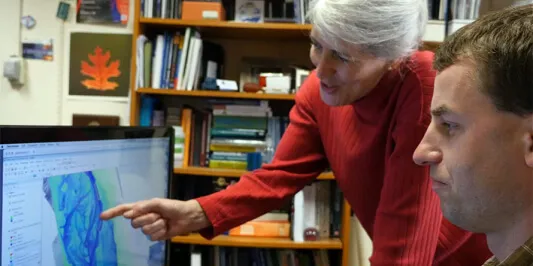Water information is fundamental to national and local economic wellbeing, protection of life and property, and effective management of the Nation’s water resources. Water data science research explores the development of new, and use of existing, methods such as machine learning, deep learning, and data visualization to harness the explosion of data being generated from new sensor platforms. CEE efforts in this area focus on novel solutions to key data challenges such as feature extraction, clustering, classification, and scaling.

Overview
CEE faculty and student research in applied water data science and sensing addresses key needs for data visualization, analysis products and tools for management, low-cost and real-time sensing, and aquatic remote sensing.
Research Highlights
Using Big Data approaches to assess ecohydrological resilience across scales

Land-cover transformation, amplification of biogeochemical flows, and climate disruption are triggering transitions in the Earth system that are unprecedented on human timescales. To ensure biosphere integrity and continued human flourishing, we need to understand the factors that determine ecosystem resilience to these diverse disturbances. This project brings together researchers from across the country in a Critical Zone Collaborative Network, combining data science, ecology, hydrology, and biogeochemistry. Students, researchers, and outreach partners will work in dynamic teams to create new knowledge through field and lab work, and improve education, policy, and participation in STEM fields. CEE researchers are developing and applying complex systems tools to study patterns in watershed data that will be used to inform understanding of ecohydrological resilience. This project is supported by the National Science Foundation.
CEE Faculty: Kristen Underwood, Donna Rizzo, Scott Hamshaw
UVM Collaborators: Julia Perdrial, Regina Toolin, Leon Walls, Michael Blouin, Byung Lee
Collaborating Institutions and Organizations: CUAHSI, U.S. Geological Survey, University of Nevada - Reno, Penn State, University of Kansas, University of Arizona, Desert Research Institute
An Ecologically Inspired Human-Machine Intelligence Approach to Recognizing Similitude in Multi-Scale Watershed Research

Identifying similarities in watershed characteristics and water quality conditions across the continental U.S. can help identify the causes of environmental change and enables the translation of research from individual studies to larger regions. Because the sheer size and diversity of these long-term monitoring data present challenges for traditional scientific and statistical methods, we will employ artificial intelligence methods along with domain experts in hydrology and ecology in an integrated human-machine learning framework. In so doing, we aim to identify the common environmental variables and parameters that are linked to similarity across scales and investigate trends in short-term and long-term water quality and streamflow data. Organizational frameworks from ecological and biological disciplines will be applied to create a new approach to organizing and summarizing similarities in watershed signals, where watersheds are grouped into guilds based on their similar functional traits. By identifying patterns of similitude in these large data sets and extracting watershed attributes with linkages to these patterns, findings of research on ecosystem processes conducted in individual watershed studies can be more readily translated to larger regions.
CEE Faculty: Scott Hamshaw, Donna Rizzo, Kristen Underwood
UVM Collaborators: Melissa Pespeni, Byung Lee
Collaborating Institutions and Organizations: Lawrence Berkley National Laboratory
Research Topics
- Data visualization
- Machine learning
- Decision-making tools
- Low-cost sensing
- Real-time data processing
- Aquatic remote sensing
Graduate Study in Applied Water Data Science
Graduate study in applied water data science addresses a critical educational need at the intersection of Civil & Environmental Engineering (CEE) and data science allowing M.S. and Ph.D. students to hone modern data analysis skills that are critical for advancing research and other applications. Students pursuing data science research in the CEE program can have little or no background in data science, computer science or coding. Highlighted courses are listed below:
- CEE 6990 – Data Science for Environmental Site Characterization
- CEE 7920 – Applied Artificial Neural Networks
- CEE 7980 - Geostatistics
- CS 3540 – Machine Learning
- CS 6540 – Deep Learning
- STAT 3870 – Data Science I
- STAT 6870 - Data Science II
- CSYS 6520 - Evolutionary Computation
- NR 4430 - GIS Practicum
Faculty Researchers
Adjunct Assistant Professor, Department of Civil and Environmental Engineering • Affiliate, Gund Institute for Environment
shamshaw@uvm.edu- Water Resources
- Machine Learning
- Environmental Sensing
- Geomatics
Acting Chair and Professor, Department of Civil and Environmental Engineering • Affiliate, Gund Institute for Environment
drizzo@uvm.eduDevelopment of new computational tools, including artificial neural networks, to improve the understanding of human induced changes on natural systems and the way we make decisions about natural resources.
Research Assistant Professor, Department of Civil and Environmental Engineering • Affiliate, Gund Institute for Environment
Kristen.Underwood@uvm.edu- Hydrology
- Fluvial Geomorphology
- Geostatistics
- Catchment Dynamics
- Clustering & Classification
- Infrastructure & Hazard Mitigation
- Bayesian Inference
Professor, Department of Civil and Environmental Engineering
lag@uvm.edu- water resources
- climate change and hazard mitigation
- sustainability and energy
- environmental and public health
- agricultural water use
- decision support systems
Associate Professor, Department of Civil and Environmental Engineering • Faculty Fellow, Gund Institute for Environment
raju.badireddy@uvm.eduWater quality engineering; water, soil, and air monitoring; resource recovery from wastewater and solids; environmental nanotechnology; remote sensors; PFAS; membrane separation processes.




